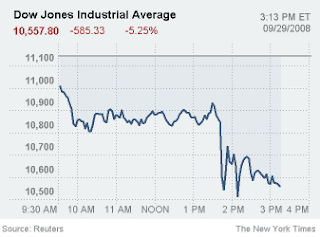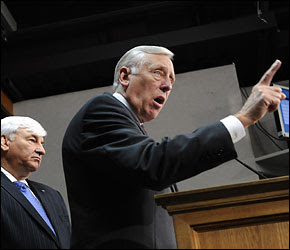
The last two weeks, I've been frustrated with people (mostly Democrats, honestly) who insist that we have to punish Wall Street execs and help homeowners in this legislation. Steve Pearlstein of the Washington Post sums up my thoughts on this perfectly this morning:
"You can try to prevent a financial meltdown or you can teach Wall Street a lesson, but you can't do both at the same time. So which will it be?"
We need to understand that there are two problems we're dealing with right now -
1. The first is that NOBODY is willing to lend money to anybody else, because they have no clue how much their assets are worth and they have no clue how reliable borrowers are. Wall Street is a deer caught in the headlights, unable to move right now - and when that happens money doesn't get pumped through our economy, with consequences potentially as disastrous as blood not pumping through the human body.
2. The second problem, of course, is the irresponsible lending habits of those Wall Street firms and the irresponsible borrowing habits of many American consumers that got us here in the first place. Contrary to popular belief, banks didn't "trick people" into getting mortgages they can't afford any more than homeowners tricked the banks into lending to them! Nobody tricked anybody and everybody cut corners.
The solution to the first problem is for the government to pump an unprecedented amount of money into the bloodstream of the American economy and do something to relieve fears of these "mortgage backed securities". The solution to the second problem is to withhold money from the economy and let the banks deal with their own mortgage backed securities and reap what they sow.
In other words, THE SOLUTIONS TO THE TWO PROBLEMS ARE DIAMETRICALLY OPPOSED TO EACH OTHER!!!! If House Republicans or sheepish Democrats want to focus on the second problem, we should just pass this legislation without them, because there is no way to achieve both objectives in the same piece of legislation.
That's not to say we should never deal with the second problem - we absolutely should. But the second problem has been with us for months now, and it will be with us for months even if we get through this current crisis. We need to deal with it later - through aid to homeowners, FBI investigations, greater regulation insuring transparency, etc... but LATER. For the time being, we should get rid of these so called "golden parachutes" to the extent that we can and lock up the big-time execs if they did anything illegal. But it makes no sense to make the banks themselves suffer at the same time that we try to help the banks. If you're a parent and your kid gets himself into a dangerous situation, the first thing you do is extract him from that dangerous situation, and only after he's safe do you light into him about how stupid it was to do that. Same principle applies here.
Obama has already shown an acknowledgement of this, which I like a lot. Part of the proposed legislation that Democrats were pushing for is to allow bankruptcy judges to renegotiate the terms of mortgages for homeowners going into default. The banking industry howled at that proposal, Democrats insisted on it... Obama said that it was absolutely inappropriate right now because the immediate problem is saving the banking industry, not tying their hands behind their backs.







